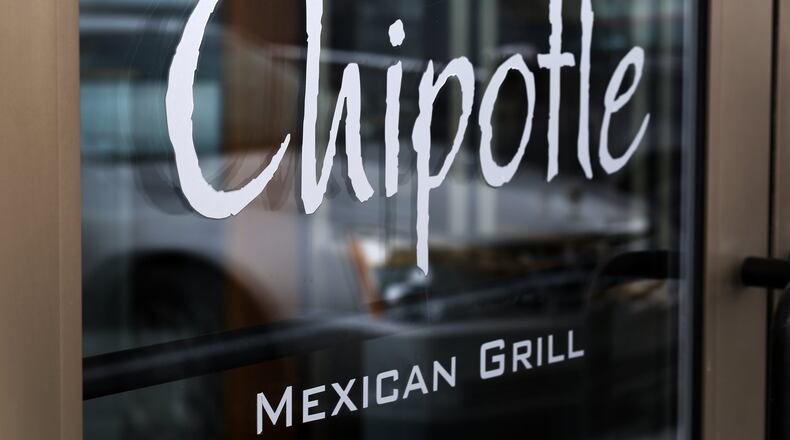- Mid-air brawl forces Delta plane to make an unscheduled stop
- Dog saves its owner from deadly snake sneaking up on him
- Older dog cries at shelter when owners leave with younger pup
- Day care director caught on video throwing child, police said
- Video: Woman pulls over police officer, accuses him of speeding
Chipotle Mexican Grill, already dealing with lawsuits related to a recent widespread E. coli outbreak, is in the midst of a separate lawsuit in Cincinnati.
Three former female general managers of Greater Cincinnati locations filed a lawsuit against the restaurant chain, claiming it “engages in a pattern and practice of discriminating against and/or terminating female managers.”
Filed in U.S. District Court in March 2013 by Stephanie L. Ochoa, Tina M. Reynolds and Elizabeth A. Rogers, the sexual discrimination lawsuit claims the women were fired from their positions unfairly, with male employees treated better and retained more often than female employees, regardless of those employees’ superior performance evaluations and resulting pay raises and bonuses earned.
The trial started Jan. 25.
Rogers started working for Chipotle in 2003 and most recently worked as general manager for the chain’s Crescent Hills, Ky., location, according to the lawsuit. She notified regional supervisor Brian Patterson she was pregnant with twins in February 2011 and was put on bed rest in April 2011 and delivered her twins on May 29, 2011. One twin died while the second remained hospitalized until that September.
In early July, Rogers’ brother-in-law died and on or about July 17, Rogers told Patterson she was not ready to return to work. Patterson proposed part-time status and Rogers agreed, but called a week later to say she could not do part-time work and would only be able to return when her doctor released her.
Rogers returned to work Aug. 2, 2011 and Herman Mobbs, a former area manager who covered the store while she was out, offered to help ease her back into working, according to the lawsuit.
The next day, Mobbs told Rogers he needed her to cover for him the rest of that week but she could not because she had a doctor’s appointment for her son.
On or about Sept. 13, 2011, a risk management audit of Rogers’ store earned a “B” but an audit Mobbs conducted 10 days later without speaking to Rogers produced a “D” grade.
Rogers questioned Mobbs the next time he was in the restaurant as to why he didn’t speak to her and he was hostile and argumentative with her, leaving her in tears, according to the lawsuit.
On Nov. 5, Mobbs told Rogers the store was understaffed, even though she told him she had just hired seven employees. She was written up for that discussion and then fired on Nov. 16, according to the lawsuit, which also alleges Rogers’ firing allowed for hiring and retention of male employees.
Ochoa started working for Chipotle in June 2005 and transferred to the chain’s downtown location in August 2008, according to the lawsuit. During her employment, she received a bonus every six months.
In January 2012, Patterson and Mobbs visited the location and Patterson told Ochoa he was very impressed and the location had improved 100 percent since his last visit three months earlier.
However, despite Patterson’s praise of Ochoa, she was fired on March 12, 2012, and replaced by a male employee, according to the lawsuit.
Reynolds, who started working for Chipotle in October 2009, most recently held the position of general manager of Chipotle’s Western Hills location. She was promoted numerous times during her tenure, receiving a bonus in 2011, plus “above expectations” in two categories and an increase in pay, according to the lawsuit.
However, on Oct. 3, 2011, Chipotle fired Reynolds and replaced her with a male employee, according to the lawsuit.
The case initially included four other employees from restaurant locations in Oxford, West Chester Twp., Clifton and Kenwood, but those claims were dismissed by a judge before trial.
Chipotle did not respond Wednesday to a request for comment.
While the E. coli outbreak that was linked to Chipotle restaurants may be over, the burrito chain’s indigestion continues.
As the Denver-based company reported continuing sales declines on Tuesday, the embattled chain also said the scope of a previously disclosed federal criminal investigation has widened beyond a single restaurant in California
Chipotle says sales sank 36 percent at established locations in January. That follows a previously reported drop of 14.6 percent for the October-to-December period, which marked the first quarterly decline since Chipotle went public a decade ago.
The Associated Press contributed to this report.
About the Author
The Latest
Featured


